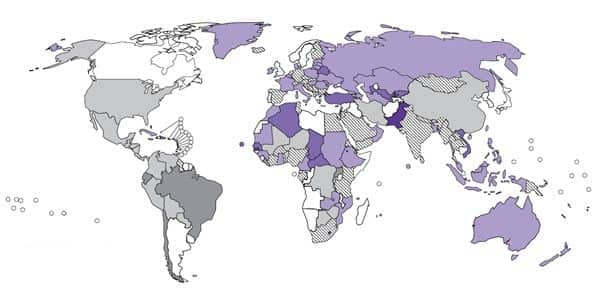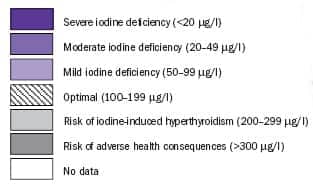Iodine is a chemical element essential for the production of thyroid hormones that regulate growth and metabolism. Diets deficient in iodine increase risk of retarded brain development in children (cretinism), mental slowness, high cholesterol, lethargy, fatigue, depression, weight gain, and goiter: a swelling of the thyroid gland in the neck. Please note that both too much and too little iodine can cause hypothyroidism, for more information, see the section on hypothyroidism.
| Photo of sushi nori. The outer seaweed wrap is an excellent natural source of iodine. |
What foods are naturally high in iodine? Iodine is a component of almost every living plant and animal. No standard measurements of iodine in food exist because iodine concentrations vary across the world. In general, foods from the sea contain the most iodine, followed by animal foods, and then plant foods. Of all foods seaweed, like kelp, is the most famous and reliable source of natural iodine, however egg and dairy products can also be good sources.
Select Food Samples for Iodine Content
Please note that other than dried seaweed and fortified salt the concentrations of iodine in these foods can vary widly and this table should be taken as a rough guide.
Please note that other than dried seaweed and fortified salt the concentrations of iodine in these foods can vary widly and this table should be taken as a rough guide.
| Food | Serving Size | Iodine |
| Dried Seaweed (Buy from Amazon.com) | 1/4 ounce | >4,500µg (4.5 mg) (3000% DV) |
| Cod | 3 ounces* | 99µg (66% DV) |
| Iodized Salt (Fortified) | 1 gram | 77µg (51% DV) |
| Baked Potato with peel | 1 medium | 60µg (40% DV) |
| Milk | 1 cup (8 fluid ounces) | 56µg (37% DV) |
| Shrimp | 3 ounces | 35µg (23% DV) |
| Fish sticks | 2 fish sticks | 35µg (23% DV) |
| Turkey breast, baked | 3 ounces | 34µg (23% DV) |
| Navy beans, cooked | 1/2 cup | 32µg (21% DV) |
| Tuna, canned in oil | 3 ounces (1/2 can) | 17µg (11% DV) |
| Egg, boiled | 1 large | 12µg (8% DV) |
Source: Linus Pauling Institute Article on Iodine
How much iodine do I need? In your entire lifetime you will need less than a teaspoon of iodine to ensure good health, however, your body cannot store iodine so you have to eat a little bit every day. You only need 150 micrograms (or 20,000th of a teaspoon) to meet your daily requirement.
If iodine is in most plant and animal foods how can anyone be deficient? According to the World Health Organization iodine deficiencies exist in 54 countries as of 2003.  Map provided by the World Health Organization
Map provided by the World Health Organization
There is no exact answer as to why iodine deficiencies occur, however, two theories exist:
 Map provided by the World Health Organization
Map provided by the World Health Organization
There is no exact answer as to why iodine deficiencies occur, however, two theories exist:
- People live in a part of the world with low levels of iodine in the soil or sea.
- People eat high amounts of refined foods that lose their iodine content during refinement. Refined sugar, for example, has no iodine.
Beware: Too much iodine can be bad for you. Over consumption of iodine can be toxic and just as damaging as a deficiency. As little as 1000 micrograms of Iodine in a day causes irritations like burning of the mouth and throat, nausea, vomiting, stomach ache, and even coma. Like under-consumption, too much iodine prevents proper production of thyroid hormones leading to goiter.
Is there Iodine in Breast Milk? New mothers should be aware that their breast milk contains iodine for their new born children. The amount of iodine in breast milk will depend on the mother's diet. A 1984 sample of women from the United States found the average concentration of iodine excreted in breast milk to be 114µg per day.4 This more than meets the adequate intake requirement of 110µg per day for infants ranging 0-6 months, but falls a little short of the 130µg per day requirement for infants ranging 7 months to 1 year. This should not necessarily be taken as a cause to eat a lot more iodine on the part of lactating women, as too much iodine can also be harmful.
I don't eat salt, meat, or seaweed, where can I get iodine? Your options are to consider supplements, buy foods enriched in iodine, or ensure that the plant foods you consume come from parts of the world where the soil is rich in iodine.
I have hypothyroidism, can I consume iodine foods, or take iodine supplements? Worldwide, iodine deficiency is the number one cause of hypothyroidism, however, iodine deficiency rarely causes hypothyroidism in the U.S. The only time you should consume iodine is if the cause of your hypothyroidism is from iodine deficiency, and even then, only consume moderate amounts. Note: Too little or too much iodine can cause hypothyroidism. Other causes of hypothyroidism include: Hashimoto’s disease, thyroiditis (inflammation of the thyroid), congenital hypothyroidism, surgical removal of part or all of the thyroid, radiation treatment of the thyroid, and some medications. If you have hypothyroidism from these causes, the U.S. National Institute of Health cautions that: "...taking iodine drops or eating foods containing large amounts of iodine—such as seaweed, dulse, or kelp—may cause or worsen hypothyroidism or hyperthyroidism." As such, only consume iodine in moderate amounts to maintain a proper level.
No comments:
Post a Comment